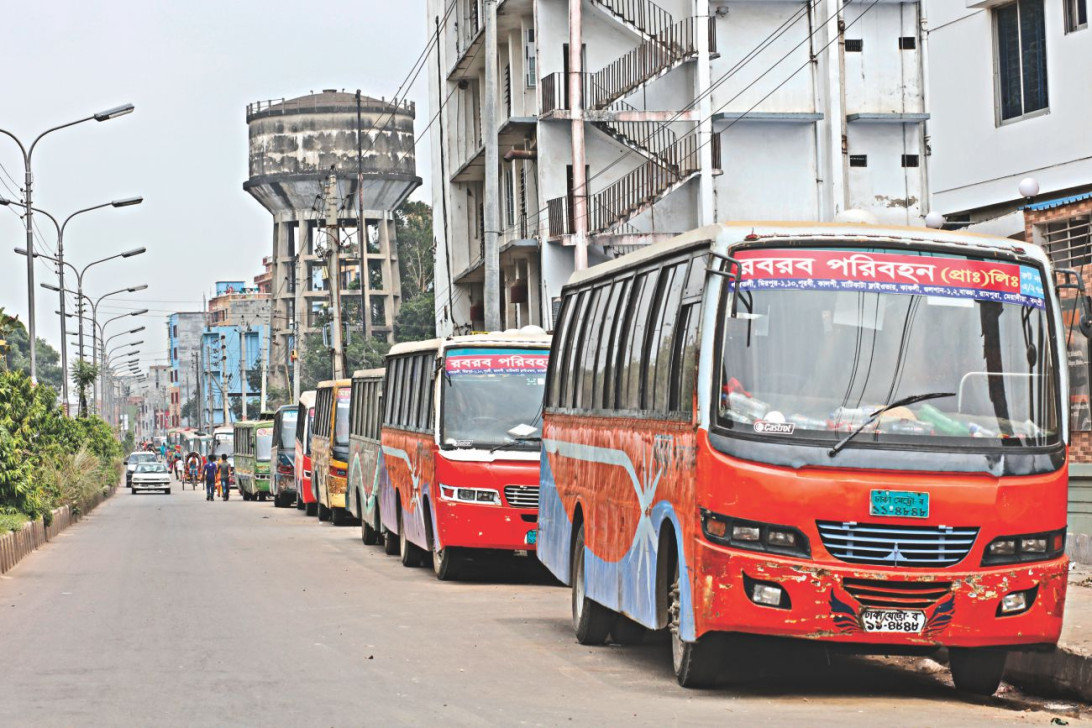
More than 800 years ago, the English King was above the law. No legal action could be taken against him. But Megna Carta of 1215 established that nobody, not even the king, was above the law of the land. Since then none is above the law in any civilised society in the world.
Unfortunately, transport owners in Bangladesh seem to have established supremacy over the laws as the British kings used to enjoy 800 years ago. They are now so powerful that they can do almost anything whatever they wish to do. Laws of the land matter little to them.
Around 40 percent buses and minibuses were not on the city streets in the last two days, even though the owners were not allowed to do that as per the Motor Vehicle Ordinance-1983 and the conditions stipulate for getting route permits for buses. It means they are violating the law and it is punishable offence.
Why were the buses and minibuses not on the city streets?
The Bangladesh Road Transport Authority (BRTA) and the transport owners announced that no public transport would operate in Dhaka in the name of “special service” or “seating service” from Sunday. The reason: such special services are illegal; plus if these services are stopped—the accommodation crisis of passengers in buses can be greatly addressed.
But many bus owners rejected the decision and took their buses off the streets to create a crisis while the BRTA launched a mobile court to take action against these special services.
People suffered immensely. Some of their constitutional rights like freedom of movement, right to life and freedom of profession and occupation were infringed due to the artificial transport crisis created by the transport owners.
Those who created the crisis have committed offence under the Motor Vehicle Ordinance 1983.
But the authorities could not take any legal action against them. On this matter, Road Transport and Bridges Minister Obaidul Quader Tuesday helplessly noted, “those (owners) in the transport sector are not ordinary people. They are very influential…When they are asked to join a meeting, they don’t show up.”
What does he mean? Are the owners more powerful than the state machineries? Or have they held hostage the state machineries by unlawful means?
Two minsters are leaders of transport owners and workers. Many politicians including ruling party men are involved with transport business. The ministers have been blindly working for the interests of the transports owners and workers. They care little about people’s interests.
Finally, the BRTA on Wednesday gave in to pressure from transport owners and decided to suspend for 15 days its drive against “seating”, “nonstop”, “gate-lock” and other so-called special bus services in the capital.
Enforcement of law by the BRTA was suspended under pressure of the transport owners, let alone taking any action against violation of law by taking off buses from the streets.
“Another meeting will be called in those 15 days to find out how the seating service can be brought under a legal framework,” said Khandaker Enayetullah, secretary general of Bangladesh Sarak Paribahan Samity. He was one of the participants of yesterday’s meeting at BRTA to resolve the crisis.
This means the transport owners are successful to force the government change the law to legalise the seating services.
Past incidents of course encouraged transport owners and workers to hold people hostage to press home their demand. It happened once just two months ago. People were made to suffer as transport workers went on a nationwide “work abstention” for two days, February 28 and March 1, protesting verdicts of courts that punished two drivers on charge of killing people by reckless driving.
The decision of the “work abstention” was made on the night of February 27 at a meeting reportedly held in Shipping Minister Shajahan Khan’s home and was attended, among others, by State Minister for Rural Development and Co-operatives Mashiur Rahman Ranga.
Shajahan is the executive president of Bangladesh Road Transport Workers Federation while Ranga is the president of Bangladesh Road Transport Owners Association.
Isn’t a conflict of interest as the two ministers are still holding positions in workers’ and owners’ associations? Isn’t a violation of their oath of offices as the ministers?
The agitation in February however forced the government to promise that it would take “legal steps” to consider the court verdicts against the drivers.
The transport owners and workers are planning to come up with more demands. On April 6 and 7, the federation held extended meeting where they decided to oppose the government move to enact a new law “Road Transport Act-2017”.
The draft law proposed that a person has to pass at least class-VIII or class-V to be eligible for professional driver’s licence or helper’s licence respectively. It also has provisions for harsher punishments for traffic rules violations. According to the draft law, one may be accused on charge of murder and tried under penal code if he is found guilty for killing people by reckless driving.
The workers’ federation termed the proposed measures as “black clauses” and decided to form human chains across the country on April 23 demanding the cancellation of those provisions. They may enforce more agitation programmes to press home their demand.
If they continue to do so, people will have to suffer immensely again and again in the coming days as transport owners and workers.
What will the government do to handle them? Will the government give in to the pressure again and drop the proposals from the draft law to keep the transport owners and workers above the law?
The government must not give into any unrealistic demand. It must uphold the rule of law and public interests.
Source: The Daily Star








